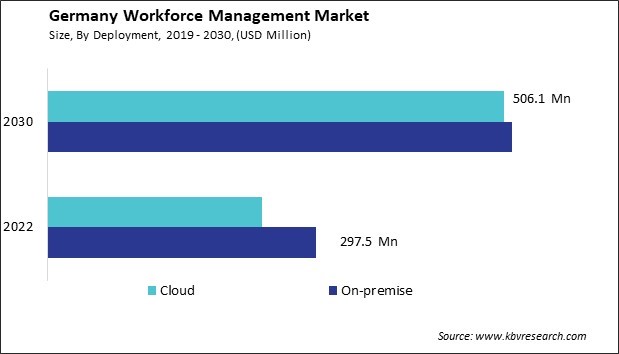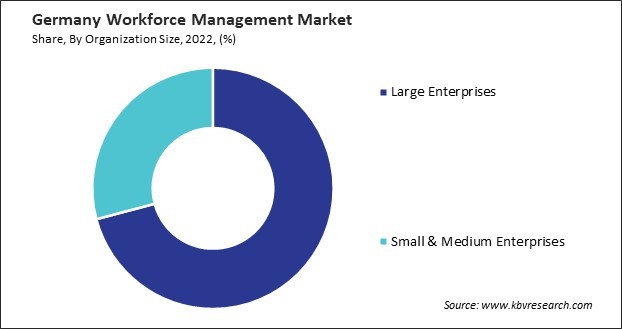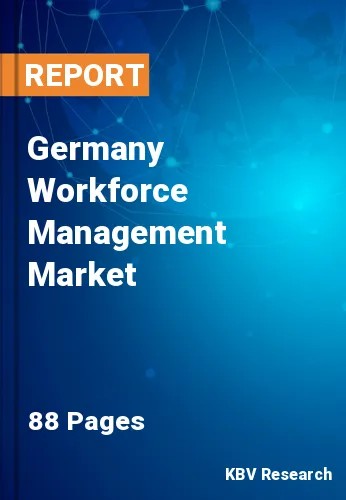The Germany Workforce Management Market size is expected to reach $1 billion by 2030, rising at a market growth of 8.5% CAGR during the forecast period.
The rising need for workforce management tools in Germany is being driven by two key factors: regulatory compliance and the adoption of AI and automation. These factors are shaping the workforce management market in Germany, influencing the demand for advanced solutions that can address the complexities of managing a modern workforce while ensuring compliance with labor laws and regulations.

The country has strict labor laws and regulations governing various aspects of employment, including working hours, overtime, and leave entitlements. Workforce management tools that offer features such as accurate time tracking, scheduling optimization, and reporting capabilities are crucial for businesses to ensure compliance with these regulations while managing their workforce effectively.
Moreover, as businesses seek to improve efficiency and productivity, they are turning to AI-powered workforce management solutions that can automate repetitive tasks, analyze data to make informed decisions and optimize workforce planning. AI and automation technologies enable businesses to streamline their workforce management processes, reduce manual effort, and make more data-driven decisions, which is particularly important in a competitive industry like Germany.
Businesses are looking for solutions to help them navigate complex regulatory environments while leveraging technology to improve their operational efficiency and competitiveness. As a result, workforce management providers in Germany are focusing on developing innovative solutions that combine compliance capabilities with AI-driven insights to meet the evolving needs of businesses in the country's dynamic business landscape.
Germany has seen a steady increase in small and medium-sized enterprises (SMEs) in recent years, contributing significantly to the country's economy and business landscape. The nation has a well-established infrastructure to support SMEs, including access to financing through banks and government-backed programs, business development support services, and favorable regulations for starting and running a business. This supportive environment has encouraged individuals to start their businesses and has contributed to the growth of the SME sector.
Additionally, Germany's strong industrial base and focus on innovation have created opportunities for SMEs to thrive. Many SMEs in Germany operate in specialized industries, leveraging their expertise and innovation to compete domestically and internationally. Furthermore, technological advancements have played a significant role in growing SMEs in Germany. The digitalization of business processes, the rise of e-commerce, and the adoption of advanced technologies such as artificial intelligence and automation have provided SMEs with new opportunities to grow their reach and improve their operations.
The increasing number of SMEs in Germany is driving a growing demand for workforce management tools tailored to small and medium-sized businesses' specific needs and challenges. These tools are crucial in helping SMEs optimize their workforce, improve operational efficiency, and ensure compliance with regulations, ultimately contributing to their growth and success in the dynamic German business landscape.
The automotive and manufacturing sectors are major employers in Germany, providing millions of jobs directly and indirectly. The expansion of these sectors leads to increased demand for skilled labor, ranging from engineers and technicians to administrative and support staff. This expansion contributes to overall employment levels and drives demand for workforce management tools that can help these industries efficiently manage their workforce, optimize productivity, and ensure compliance with labor regulations.
Germany's automotive and manufacturing sectors are major contributors to the country's exports, with products ranging from automobiles and machinery to industrial equipment and components. Expanding these sectors can lead to increased international trade and business opportunities, which require workforce management tools to support global operations, manage international teams, and facilitate cross-border collaboration.
According to the International Trade Administration, in 2025, 84 percent of German manufacturers are poised to channel significant investments, totaling EUR 10 billion (USD 10.52 billion) annually, into the integration of smart manufacturing technologies. This commitment to technological advancement extends across various sectors, with the automotive industry earmarking approximately EUR 1.2 billion per year, machinery and equipment alongside plant engineering and construction at a noteworthy EUR 1.5 billion.
Additionally, expanding the automotive and manufacturing sectors often involves complex supply chains that span multiple regions and countries. Effective supply chain management requires sophisticated workforce management tools that can help businesses optimize staffing levels, track production processes, and coordinate activities across the supply chain to ensure timely delivery and quality control. Thus, Germany's expanding automotive and manufacturing sectors are driving the demand for advanced workforce management tools that can support their growth, address industry-specific challenges, and help them remain competitive in the global industry.

The workforce management market in Germany is characterized by several key players offering a wide range of services tailored to the wants of businesses across various industries. These companies provide workforce management software, consulting services, and related technologies to help organizations optimize their workforce operations, enhance productivity, and ensure compliance with labor regulations. Some of the notable participants in the workforce management market in Germany include SAP SE, Software AG, Kronos Incorporated, ADP, Oracle Corporation, Microsoft Corporation, Zucchetti GmbH, Plan4U, Quinyx, Fresenius Netcare GmbH, Atoss Software AG, Zywave (formerly ESIS GmbH), etc.
One of the major participants in the German workforce management market is SAP SE, a global leader in enterprise software. SAP offers comprehensive workforce management solutions that integrate with its broader suite of business applications, providing businesses in Germany with tools for managing their workforce efficiently and effectively.
Oracle Corporation is another significant player in the German industry, providing cloud-based workforce management solutions that cater to the needs of businesses of all sizes. Oracle's workforce management offerings include features for time tracking, scheduling, and labor analytics designed to help businesses in Germany optimize their workforce productivity and compliance with labor regulations.
Kronos Incorporated, a global provider of workforce management, also has a presence in the German industry. Kronos offers a range of workforce management tools that help businesses in Germany manage their workforce more effectively, improve operational efficiency, and ensure compliance with labor laws and regulations.
Local providers such as Atoss Software AG, headquartered in Munich, also play a significant role in the German workforce management market. Atoss offers workforce management solutions tailored to the specific needs of businesses in Germany, including solutions for time and attendance management, workforce scheduling, and demand-oriented workforce deployment.
In addition to these key players, several other companies contribute to the diversity and competitiveness of the German workforce management market. These participants offer a variety of solutions and services, reflecting the dynamic nature of workforce management in Germany and the evolving needs of businesses in the country's diverse industries.
By Deployment
By Organization Size
By Solution
By Application
Our team of dedicated experts can provide you with attractive expansion opportunities for your business.

